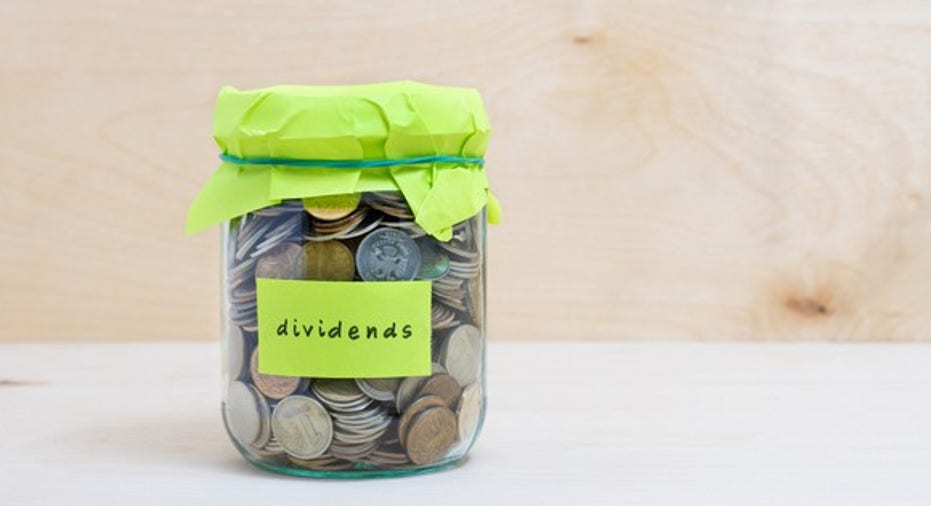What Is Dividend Income?

Image source: Getty Images.
Dividend income refers to any distribution of a company earnings to shareholders from stocks or mutual funds you own. The tax treatment of dividend income depends on whether the income meets the definition of a "qualified dividend" and if it is held in a retirement account, like an IRA.
How companies use their profits
Companies can choose to do several things with their earnings. They can retain earnings within the business, for purposes such as to expand their operations, pay down debt, or to build up a stockpile of cash. They can choose to buy back shares, which reduces the outstanding share count, and therefore makes the remaining stock more valuable.
Finally, the company can choose to distribute some of its profits to shareholders, in cash or stock, which is known as a dividend. Most dividend-paying companies choose to make payments quarterly, but annual and monthly dividends aren't uncommon. Companies can also pay "special dividends," which are one-time payments.
Some companies are required to pay out most of their income as dividends. Real estate investment trusts (REITs) and business development companies (BDCs) are examples, as both types of companies are required to pay out at least 90% of their net income to shareholders to maintain a pass-through tax structure.
How is dividend income taxed?
If a dividend meets the definition of a "qualified dividend," it will be taxed at lower tax rates than ordinary income. If not, it will be taxed at the investor's marginal tax rate (tax bracket).
|
Marginal Tax Bracket |
Qualified Dividend Tax Rate |
Non-Qualified Dividend Tax Rate |
|---|---|---|
|
10% |
0% |
10% |
|
15% |
0% |
15% |
|
25% |
15% |
25% |
|
28% |
15% |
28% |
|
33% |
15% |
33% |
|
35% |
15% |
35% |
|
39.6% |
20% |
39.6% |
Data source: Internal Revenue Service.
What is a qualified dividend?
In order to qualify for the lower tax rate, a dividend you receive must meet these two criteria:
- The dividend must have been paid by a U.S. corporation or a qualified foreign corporation.
- You must have held the stock for more than 60 days during the 121-day period starting 60 days before the ex-dividend date. Preferred stock has a longer holding period requirement of 90 days out of the 181-day period starting 90 days before the stock's ex-dividend date.
Examples of dividends that are not "qualified dividends" include capital gain distributions (such as a distribution when a company sells property), dividends from a tax-exempt organization, dividends paid on bank and credit union deposits, and certain pass-through dividends.
It's also worth noting that if you are enrolled in a dividend reinvestment plan (Drip), your dividends are still taxable, even though you didn't actually receive cash. For a thorough guide to dividend taxation, check out the IRS'website.
Dividend income in retirement accounts
The main incentive for using retirement accounts to invest is for the tax benefits. Pre-tax accounts like traditional IRAs and most 401(k)s are tax-deferred, while after-tax accounts like Roth IRAs are tax-free. Either way, dividend income is not subject to tax in these accounts. If the account is tax-deferred, the money will eventually be treated as taxable income when withdrawn, but investors are still free to let the money compound year after year in the meantime.
The $15,834 Social Security bonus most retirees completely overlook If you're like most Americans, you're a few years (or more) behind on your retirement savings. But a handful of little-known "Social Security secrets" could help ensure a boost in your retirement income. For example: one easy trick could pay you as much as $15,834 more... each year! Once you learn how to maximize your Social Security benefits, we think you could retire confidently with the peace of mind we're all after.Simply click here to discover how to learn more about these strategies.
This article is part of The Motley Fool's Knowledge Center, which was created based on the collected wisdom of a fantastic community of investors. We'd love to hear your questions, thoughts, and opinions on the Knowledge Center in general or this page in particular. Your input will help us help the world invest, better! Email us atknowledgecenter@fool.com. Thanks -- and Fool on!
Try any of our Foolish newsletter services free for 30 days. We Fools may not all hold the same opinions, but we all believe that considering a diverse range of insights makes us better investors. The Motley Fool has a disclosure policy.



















